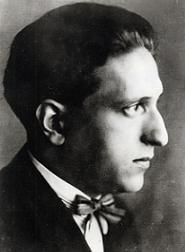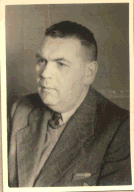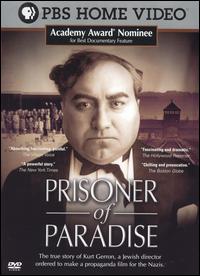
Brundibár is a children's opera by Jewish Czech composer Hans Krása with a libretto by Adolf Hoffmeister, made most famous by performances by the children of Theresienstadt concentration camp (Terezín) in occupied Czechoslovakia. The name comes from a Czech colloquialism for a bumblebee.

Kurt Gerron was a German Jewish actor and film director. He had a very successful career in cabaret and film before World War II, but was then forbidden to work and was sent to Theresienstadt Ghetto after the Nazis had occupied the Netherlands, where he and his family had fled to. He was forced by the Nazis to make a propaganda film about Theresienstadt, officially named Theresienstadt. Ein Dokumentarfilm aus dem jüdischen Siedlungsgebiet, before he and his wife, Olga Gerson-Meyer, were sent to Auschwitz concentration camp and murdered. The film was completed not long before the end of the war, but was never shown to the public, and only fragments remain.

Holocaust (1978) is an American television miniseries which aired on NBC over five nights, from April 16–20, 1978.

Theresienstadt Ghetto was established by the SS during World War II in the fortress town of Terezín, in the Protectorate of Bohemia and Moravia. Theresienstadt served as a waystation to the extermination camps. Its conditions were deliberately engineered to hasten the death of its prisoners, and the ghetto also served a propaganda role. Unlike other ghettos, the exploitation of forced labor was not economically significant.

Pavel Haas was a Czech composer who was murdered during the Holocaust. He was an exponent of Leoš Janáček's school of composition, and also utilized elements of folk music and jazz. Although his output was not large, he is notable particularly for his song cycles and string quartets.

Theresienstadt. Ein Dokumentarfilm aus dem jüdischen Siedlungsgebiet, unofficially Der Führer schenkt den Juden eine Stadt, was a black-and-white projected Nazi propaganda film. It was directed by the German Jewish prisoner Kurt Gerron and the Czech filmmaker Karel Pečený under close SS supervision in the Theresienstadt concentration camp, and edited by Pečený's company, Aktualita. Filmed mostly in the autumn of 1944, it was completed on 28 March 1945 and screened privately four times. After the war, the film was lost but about twenty minutes of footage was later rediscovered in various archives.

Paradise Camp is a 1986 documentary film about Theresienstadt concentration camp in Czechoslovakia, written and directed by Australians Paul Rea and Frank Heimans, respectively. Czechoslovakian Jews were first told that Theresienstadt was a community established for their safety. They quickly recognized it as a ghetto and concentration camp.
Voices of the Children is a 1999 Emmy-Award winning documentary film written and directed by Zuzana Justman. It tells the story of three people who were imprisoned as children in the Terezin concentration camp. It was produced and shown on television in the United States.
Way To Heaven is a 2004 play by the award-winning Spanish playwright Juan Mayorga.
Spuren nach Theresienstadt / Tracks to Terezín is a 2007 film with Herbert Thomas Mandl, a survivor of the Holocaust.

Karl Rahm was a Sturmbannführer (major) in the German Schutzstaffel who, from February 1944 to May 1945, served as the commandant of the Theresienstadt concentration camp. Rahm was the third and final commander of the camp, succeeding Siegfried Seidl and Anton Burger. He was hanged for war crimes.

The Ghetto Swingers were a jazz band organised in the Nazi concentration camp Theresienstadt.
Hans Günther was an SS-Sturmbannführer who was the head of the "Central Office for Jewish Emigration in Prague" during World War II. He was in charge of the deportation of Czech Jews to death camps during the Holocaust. He was killed by Czech partisans in 1945.

Roy Kift is an English actor and playwright who is resident in Germany. He is best known for his 1980 play Stronger than Superman.
Malcolm Clarke is an English filmmaker who works in China.

Benjamin Israel Murmelstein was an Austrian rabbi. He was one of 17 community rabbis in Vienna in 1938 and the only one remaining in Vienna by late 1939. An important figure and board member of the Jewish group in Vienna during the early stages of the Second World War, he was also an "Ältester" of the Judenrat in the Theresienstadt concentration camp after 1943. He was the only "Judenältester" to survive the Holocaust. He helped thousands of Jews in emigrating and is accused of being a Nazi collaborator.

The Theresienstadt Papers are a collection of historical documents of the Jewish self-government of Theresienstadt concentration camp. These papers include an "A list" of so-called "prominents" interned in the camp and a "B-list" created by the Jewish Elders themselves. The Theresienstadt papers include two albums with biographies and many photographs, 64 watercolors and drawings from prisoners in Theresiendstadt, and the annual report of the Theresienstadt Central Library. The papers were preserved at the liberation of the camp in May 1945 by Theresienstadt librarian Käthe Starke-Goldschmidt and later loaned to the Altona Museum for Art and Cultural History in Hamburg by her son Pit Goldschmidt. The collection was opened for viewing by the public in 2002 at the Heine Haus branch of the Altona Museum.
Maurice Rossel was a Swiss doctor and International Committee of the Red Cross (ICRC) official during the Holocaust. He is best known for visiting Theresienstadt concentration camp on 23 June 1944; he erroneously reported that Theresienstadt was the final destination for Jewish deportees and that their lives were "almost normal". His report, which is considered "emblematic of the failure of the ICRC" during the Holocaust, undermined the credibility of the more accurate Vrba-Wetzler Report and misled the ICRC about the Final Solution. Rossel later visited Auschwitz concentration camp. In 1979, he was interviewed by Claude Lanzmann; based on this footage, the 1997 film A Visitor from the Living was produced.
During World War II, the Theresienstadt Ghetto was used by the Nazi SS as a "model ghetto" for deceiving International Committee of the Red Cross representatives about the ongoing Holocaust and the Nazi plan to murder all Jews. The Nazified German Red Cross visited the ghetto in 1943 and filed the only accurate report on the ghetto, describing overcrowding and undernourishment. In 1944, the ghetto was "beautified" in preparation for a delegation from the International Committee of the Red Cross (ICRC) and the Danish government. The delegation visited on 23 June; ICRC delegate Maurice Rossel wrote a favorable report on the ghetto and claimed that no one was deported from Theresienstadt. In April 1945, another ICRC delegation was allowed to visit the ghetto; despite the contemporaneous liberation of other concentration camps, it continued to repeat Rossel's erroneous findings. The SS turned over the ghetto to the ICRC on 2 May, several days before the end of the war.












